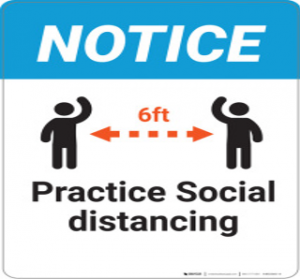By GALA Expert
December 6, 2023
Posted on: April 30th, 2020 by Sam Bullington

“No one overreacts. It’s just that what you’re reacting to may not be what’s in front of you.” –Terry Real
The experience of quarantine in response to the coronavirus pandemic has been emotionally challenging for people. While much has been made of coronavirus as a great equalizer and public health officials have reminded folks that the coronavirus does not discriminate, there are strongly differential impacts to every aspect of the pandemic, including the experience of quarantine. As just one example: the implications of wearing masks to the store is very different for Black people than whites, given the dangers of being Black in U.S. society and stereotypes about criminality. What you need to do to stay alive in response to one set of threats may contradict what you need to do to stay alive in response to another.
The pandemic has been not only (again) exposing the kinds of societal disparities that social justice activists have been working to transform, but bringing to the surface numerous personal and collective experiences of trauma, as part of its purpose, I believe, is to facilitate their acknowledgement and healing. The focus on isolating at home, for instance, has brought Holocaust trauma to mind for some, especially given that the Trump years have already drawn parallels to Nazi Germany. For many GALA choruses, the coronavirus pandemic has brought a resurgence of memories and trauma from the AIDS epidemic. The overlap with past trauma has made the current challenges of coronavirus even more acute.
For myself, I’ve been noticing both trans- and polyamory-specific traumas and challenges related to quarantine. As a white person raised in the middle class, I am fairly protected from the worst assaults rendered by the coronavirus. Though I lost most of my income (like so many others) when we went into lockdown, I am not expected to risk my life as part of my job. I have a safe place to shelter. I have people who care about my well-being. Losing physical access to some of those Beloveds, however, proved to be a catalyst to a deeply emotional remembering of what it has felt like to be a trans queer polyamorous person in society.

As a non-binary trans person, my whole life people have treated me as a threat—a dangerous disrupter, a sexual predator, a hybrid monster, a freak—which has been very devastating. Because I don’t fit into conventional gender categories—nor am I easily accommodated in the societal structure based on these categories—people often feel uneasy around me. And when they feel uneasy, they often lash out. People have come up to me on the street to tell me I’m going to burn in hell; guys in trucks have followed me and tried to run me off the road. So the experience of quarantine, of having loved ones perceive me as a threat and keeping their distance—though I know it’s not personal—has reactivated that very trans-specific heartbreak.
The first time one of my Beloveds put on a mask to see me, it unexpectedly took me straight back to college.
I came out in a fundamentalist Christian fellowship in college. I didn’t grow up Christian—they just happened to be the first people I met in college and, since I’d been a social outcast in high school (having been labelled a “lezzie” though at the time I didn’t even know what that meant), I was thrilled to find people wanting to be my friend.
My first lover was my Bible study leader and our tentative explorations were filled with vulnerability. She was convinced we were compromising our salvation by our “sinning,” so we agreed to speak with one of the fellowship leaders. Once we shared our secret, the punishment was very severe. We were both removed from our leadership positions (I’d been music leader) and told we could never speak to one another again.
I wasn’t allowed to go back to the room that we shared and instead slept on the floor of the apartment of the fellowship leader. Shocked at losing my first love—and my home—in the course of 24 hours, I lay awake on the floor of the living room sobbing in agony and isolation night after night. Though we’d previously been friends, the fellowship leader grew aloof and guarded and began changing clothes in the bathroom. I was placed under surveillance by fellowship leaders, forbidden from studying alone or at night with female friends, until I was eventually driven out of the fellowship entirely for being “unteachable.”
While I thought I’d successfully moved on from this early trauma in my sexual life, at the beginning of quarantine, the visual of my cherished friend putting on a mask to be in my presence took me right back to how I felt watching the fellowship leader go into the bathroom to change clothes out of my line of sight. When this friend turned around to go inside to be with my other Beloveds in the home I no longer would have access to during quarantine, I felt the ache in my heart that I had felt in college, standing on my dorm room balcony every Wednesday night watching all my former friends go off to Bible study—what had formerly been the center of my life where I was no longer welcome.
This was not the only abrupt loss of vital community that I relived during the early days of quarantine. After being driven out of the Christian fellowship, the next home I found for myself was women’s community, formative in the development of my political consciousness and core to who I am as a person. I spent 14 years in the world of women’s music festivals before deciding to go on testosterone. Although one of the aspects of women’s festivals that I initially really adored was the broad range of gender expression present, the years leading up to my decision to go on hormones were marked by brutal warfare between trans communities and lesbian separatist communities and I was caught in the crossfire. Though my loyalty was with the festivals, my decision to go on hormones reclassified me as a threatening and shameful traitor. Not only was I personally no longer welcome, within a couple years the entire festival decided to shut down after 40 years rather than share space with trans people.

As a trans/queer person, my place in the human family has always felt insecure and uncertain, never something that could be relaxed into or counted on. Being trans has always felt like being the nuclear reactor that nobody wanted in their neighborhood, so I’ve had a lifetime of experiences of being told to move along. My place was always dependent upon someone else’s generosity so something that I needed to work really hard to maintain and appreciate, knowing it could be taken away at any time. That’s why I started my own trans choir—to give others who’ve had similar experiences a secure place they could call home—and why Phoenix will never have auditions or identity requirements because I never want anyone to feel turned away.
During this experience of quarantine, not only are we watching the defining of “essential work” and “essential consumption,” but also “essential intimacy.” Quarantine guidelines may seem obvious to those who are in conventional families and partnerships: “stay at home.” But, for those of us whose lives are based on multiplicity and fluidity, the immediate question arises: which home? While the concentrated experience of quarantine certainly has put pressures on marriages, most of my friends who are in monogamous relationships are emotionally thriving (as much as is possible during a terrifying and highly disruptive global pandemic), enjoying the couple’s privilege interwoven into quarantine guidelines. While those of us who are polyamorous, as well as those whose children travel back and forth between parental households, are having to make complicated and sometimes heartbreaking individual choices—oftentimes enduring scrutiny and judgment by those whose intimate lives are less complex—including having access to Beloveds who are essential to one’s well-being abruptly severed by other partners. Even within egalitarian polyamory networks, new hierarchies are being formed as “nesting partners”—those with whom you share a residence—receive priority status.
While some, like myself, are suffering from being ripped away from loved ones, others are trapped in households where they don’t feel safe: for instance, many LGBTQ teens confined to homes with unsupportive families, as well as those in abusive relationships.
After losing access to my Beloveds—and the past trauma that was triggered in me as a result—I walked around the lake near my house and cried and cried because that’s all I could really do. At times there was so much pressure in my chest, I could barely breathe. And it made me contemplate the relationship of this global crisis around breath to our vast store of grief that we are sitting on personally and collectively.
What is your grief that has been activated by this global pandemic and experience of quarantine? How can acknowledging this grief allow people to heal it and not carry it forward into the future? And what can we learn from one another as a result?
Join Sam Bullington and GALA’s New Harmony Task Force for this webinar:
“Navigating the Quiet Space: LGBTQIA+ Isolation & Mental Health during COVID-19”
Thursday, May 7
8:00-9:00 pm Eastern
Register for the webinar
